The Righteous Mind: Why Good People Are Divided by Politics and Religion
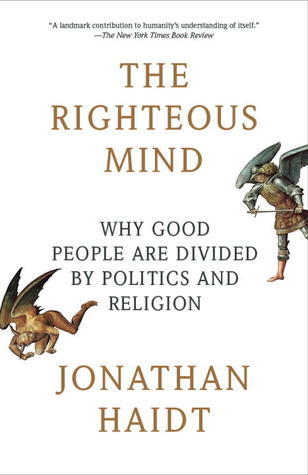
Summary:
NEW YORK TIMES BESTSELLER • The acclaimed social psychologist challenges conventional thinking about morality, politics, and religion in a way that speaks to conservatives and liberals alike—a “landmark contribution to humanity’s understanding of itself” ( The New York Times Book Review ).
Drawing on his twenty-five years of groundbreaking research on moral psychology, Jonathan Haidt shows how moral judgments arise not from reason but from gut feelings. He shows why liberals, conservatives, and libertarians have such different intuitions about right and wrong, and he shows why each side is actually right about many of its central concerns.
In this subtle yet accessible book, Haidt gives you the key to understanding the miracle of human cooperation, as well as the curse of our eternal divisions and conflicts. If you’re ready to trade in anger for understanding, read The Righteous Mind .
My Feb 2017 Goodreads Review:
I had been putting off reading this one after Haidt pissed me off in an interview about TWs, though I did still follow him and read/watch his articles and videos. But, after reading 5 other books on political psychology, I ran out of any other audiobook options on the subject from my library, so I finally checked it out. And I must say, I'm glad I waited.
This is a great book, with so much to think about (I'll definitely have to read it again to fully absorb more of it) from all sorts of perspectives (biology/evolution, anthropology, religion, politics, sociology, psychology, philosophy)-- but I feel like I very much benefited from the information in the other books I read first (Many/most he cites, too), like Lakoff, Westen, Joshua Greene, Chris Mooney, etc.
It's not that he does a poor job of explaining or contextualizing his points, so I'm not exactly sure why I feel this way, but I do. I don't think I would have gotten as much out of this book, or been able to take all the information in it quite so seriously (especially the uncomfortable-for-liberals points) if this had been the first book on political psychology I read.
It's a great book and certainly worth reading at some point by anyone with an interest in understanding our current political climate.
The Political Mind: Why You Can't Understand 21st-Century American Politics with an 18th-Century Brain Cover
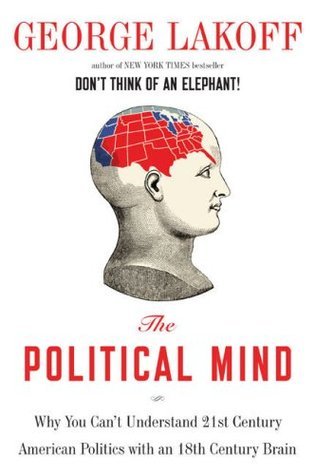
Summary:
A groundbreaking scientific examination of the way our brains understand politics from a New York Times bestselling author
One of the world 's best-known linguists and cognitive scientists, George Lakoff has a knack for making science make sense for general readers. In his new book, Lakoff spells out what cognitive science has discovered about reason, and reveals that human reason is far more interesting than we thought it was. Reason is physical, mostly unconscious, metaphorical, emotion-laden, and tied to empathy-and there are biological explanations behind our moral and political thought processes. His call for a New Enlightenment is a bold and striking challenge to the cherished beliefs not only of philosophers, but of pundits, pollsters, and political leaders. The Political Mind is a passionate, erudite, and groundbreaking book that will appeal to anyone interested in how the mind works and how we function socially and politically.
My Dec 2016 Goodreads Review:
Excellent book to learn how our brains think, and how activating various frames (the containers our brains organize information in) affects how we handle information and politics. I *know* the democratic party has had to have read his work, but why do they use almost none of the science that would actually help them? UGH. >.>
The Republican Brain: The Science of Why They Deny Science—and Reality
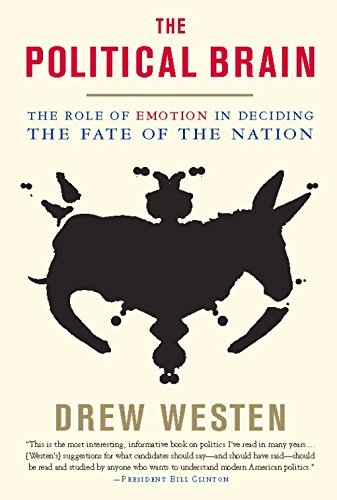
Summary:
The Political Brain is a groundbreaking investigation into the role of emotion in determining the political life of the nation. For two decades Drew Westen, professor of psychology and psychiatry at Emory University, has explored a theory of the mind that differs substantially from the more "dispassionate" notions held by most cognitive psychologists, political scientists, and economists and Democratic campaign strategists. The idea of the mind as a cool calculator that makes decisions by weighing the evidence bears no relation to how the brain actually works. When political candidates assume voters dispassionately make decisions based on "the issues," they lose. That's why only one Democrat has been re-elected to the presidency since Franklin Roosevelt—and only one Republican has failed in that quest.
In politics, when reason and emotion collide, emotion invariably wins. Elections are decided in the marketplace of emotions, a marketplace filled with values, images, analogies, moral sentiments, and moving oratory, in which logic plays only a supporting role. Westen shows, through a whistle-stop journey through the evolution of the passionate brain and a bravura tour through fifty years of American presidential and national elections, why campaigns succeed and fail. The evidence is overwhelming that three things determine how people vote, in this order: their feelings toward the parties and their principles, their feelings toward the candidates, and, if they haven't decided by then, their feelings toward the candidates' policy positions.
Westen turns conventional political analyses on their head, suggesting that the question for Democratic politics isn't so much about moving to the right or the left but about moving the electorate. He shows how it can be done through examples of what candidates have said—or could have said—in debates, speeches, and ads. Westen's discoveries could utterly transform electoral arithmetic, showing how a different view of the mind and brain leads to a different way of talking with voters about issues that have tied the tongues of Democrats for much of forty years—such as abortion, guns, taxes, and race. You can't change the structure of the brain. But you can change the way you appeal to it. And here's how…
My Nov 2016 Goodreads Review:
SO IMPORTANT. And fascinating! I wish I could make everyone with even a passing interest in politics read this. I feel like I understand Americans & our party system infinitely better now... for better and for worse. I've never been a fan of the GOP, but I had no idea how very consciously the party has crafted the psychological strategy they have used with unbelievable accuracy and success to control the minds of the public, even those on the left who hate the GOP-- it's amazing to see how much of our (lefties) own neurological networks and psychological framing comes straight from the GOP's thinktanks. And, I've also never been a fan of the democratic party, and this book managed to make me feel even more hopeless about them (politically cowardly to an obscene degree tbh, all the examples in this book are utterly infuriating)... but also more hope*ful.* If only more democrats read this book and take what psychology and cognitive linguistics have discovered these last few decades and ACTUALLY APPLY THE KNOWLEDGE, we could actually make great strides in helping our country get where it ought to be by now.
Basically, before reading this book, I was one of the "emotions have no place in politics, it should be about the issues!" people, like most folks on the left, but I am reformed now. It's arbitrary and artificial to insist that humans ignore their entire emotional selves when trying to pick leaders, who, after all, we all must trust to make decisions in line with our values about way more issues than we could ever all keep track of. As the book "Moral Tribes" explains, emotions are like software shortcuts for the brain, as the brain cannot store/process all the knowledge in the world, so emotions help guide us. (He makes an excellent and articulate case for it, I just absolutely suck at explaining things after I read them (ugh)). Anyway, this book makes a great case for democrats to get some emotional literacy and a lot of emotional communication skills and actually step up for all the Americans who NEED them to actually give the GOP an actual run for their money.
tl;dr: SUPER INTERESTING AND IMPORTANT, READ IT.
The Republican Brain: The Science of Why They Deny Science—and Reality Cover
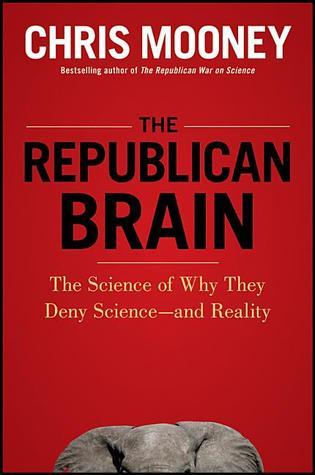
Summary:
Bestselling author Chris Mooney uses cutting-edge research to explain the psychology behind why today's Republicans reject reality—it's just part of who they are. From climate change to evolution, the rejection of mainstream science among Republicans is growing, as is the denial of expert consensus on the economy, American history, foreign policy and much more. Why won't Republicans accept things that most experts agree on? Why are they constantly fighting against the facts?
Science writer Chris Mooney explores brain scans, polls, and psychology experiments to explain why conservatives today believe more wrong things; appear more likely than Democrats to oppose new ideas and less likely to change their beliefs in the face of new facts; and sometimes respond to compelling evidence by doubling down on their current beliefs.
Goes beyond the standard claims about ignorance or corporate malfeasance to discover the real, scientific reasons why Republicans reject the widely accepted findings of mainstream science, economics, and history—as well as many undeniable policy facts (e.g., there were no “death panels” in the health care bill).
Explains that the political parties reflect personality traits and psychological needs—with Republicans more wedded to certainty, Democrats to novelty—and this is the root of our divide over reality.
Written by the author of The Republican War on Science, which was the first and still the most influential book to look at conservative rejection of scientific evidence. But the rejection of science is just the beginning…
Certain to spark discussion and debate, The Republican Brain also promises to add to the lengthy list of persuasive scientific findings that Republicans reject and deny.
My Nov 2017 Goodreads Review:
One of my favorite reads lately, and I'm going to have to buy a copy so I can re-read and take copious notes/highlights and attempt to force all my friends to read it. This is deliciously academically detailed for a pop sci book while still being very readable (And in the short parts that are less so, he gives warning so you can skip ahead if you don't want to read "wonky" bits). I really can't emphasize enough how important it is that Americans start learning the basics of Political psychology so we can start understanding each other, working together, and have a functioning government again. Despite the title, this book is not at all about badmouthing Republicans, though it also doesn't shy away from discussing the differences in how our brains work, but Mooney does an excellent job of doing so without any judgement, and while also emphasizing the personality traits of conservatives that we liberals very much need to work on ourselves, too.
Moral Tribes: Emotion, Reason, and the Gap Between Us and Them
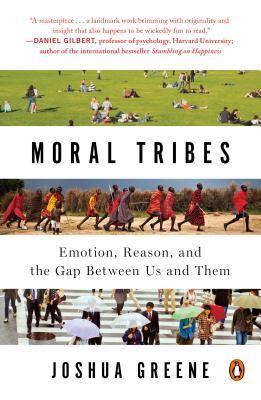
Summary:
Our brains were designed for tribal life, for getting along with a select group of others (Us) and for fighting off everyone else (Them). But modern times have forced the world’s tribes into a shared space, resulting in epic clashes of values along with unprecedented opportunities. As the world shrinks, the moral lines that divide us become more salient and more puzzling. We fight over everything from tax codes to gay marriage to global warming, and we wonder where, if at all, we can find our common ground.
A grand synthesis of neuroscience, psychology, and philosophy, Moral Tribes reveals the underlying causes of modern conflict and lights the way forward. Greene compares the human brain to a dual-mode camera, with point-and-shoot automatic settings (“portrait,” “landscape”) as well as a manual mode. Our point-and-shoot settings are our emotions—efficient, automated programs honed by evolution, culture, and personal experience. The brain’s manual mode is its capacity for deliberate reasoning, which makes our thinking flexible. Point-and-shoot emotions make us social animals, turning Me into Us. But they also make us tribal animals, turning Us against Them. Our tribal emotions make us fight—sometimes with bombs, sometimes with words—often with life-and-death stakes.
An award-winning teacher and scientist, Greene directs Harvard University’s Moral Cognition Lab, which uses cutting-edge neuroscience and cognitive techniques to understand how people really make moral decisions. Combining insights from the lab with lessons from decades of social science and centuries of philosophy, the great question of Moral Tribes is this: How can we get along with Them when what they want feels so wrong to Us?
Ultimately, Greene offers a set of maxims for navigating the modern moral terrain, a practical road map for solving problems and living better lives. Moral Tribes shows us when to trust our instincts, when to reason, and how the right kind of reasoning can move us forward.
A major achievement from a rising star in a new scientific field, Moral Tribes will refashion your deepest beliefs about how moral thinking works and how it can work better.
My Nov 2016 Goodreads Review:
Greene takes a subject that less nerdy folks might find somewhat dry (moral philosophy and neuroscience!) and with a conversational and funny style, makes it eminently readable. Which is great because it allows me to recommend this book to EVERYONE, regardless of level of nerdiness (So long as its at least at the level of reading non-fiction). I got this book after the cluster**** of the 2016 election, looking for ways to understand and communicate with, the other side. This absolutely helped me understand the differences in the way I think and other significant chunks of my country, and, while it doesn't directly address how to communicate across the aisle like another book I'm currently reading does, it also adds important depth of understanding to my reading of the communication-based book.
Especially for my friends involved in politics &/or activism, I highly recommend checking this out. And, if you're into audio books, the narration on this is EXCELLENT and makes for quite enjoyable listening, actually. Someone who doesn't listen to audiobooks drove somewhere with my recently, and this was my commute listening, and they were confused as to why it sounded like someone super intelligent was just conversationally chatting with us, instead of, i guess, dry boring book-reading. To me that's a good recommendation for the audiobook!
The All New Don't Think of an Elephant!: Know Your Values and Frame the Debate
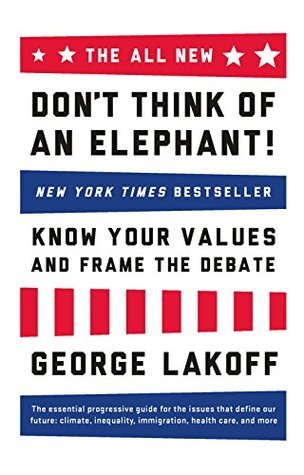
Summary:
Ten years after writing the definitive, international bestselling book on political debate and messaging, George Lakoff returns with new strategies about how to frame today’s essential issues.
Called the “father of framing” by The New York Times, Lakoff explains how framing is about ideas—ideas that come before policy, ideas that make sense of facts, ideas that are proactive not reactive, positive not negative, ideas that need to be communicated out loud every day in public.
The ALL NEW Don’t Think of an Elephant! picks up where the original book left off—delving deeper into how framing works, how framing has evolved in the past decade, how to speak to people who harbor elements of both progressive and conservative worldviews, how to counter propaganda and slogans, and more.
In this updated and expanded edition, Lakoff, urges progressives to go beyond the typical laundry list of facts, policies, and programs and present a clear moral vision to the country—one that is traditionally American and can become a guidepost for developing compassionate, effective policy that upholds citizens’ well-being and freedom.
My March 2017 Goodreads Review:
All progressives should read this short book before having another political debate/conversation. It's legit important information if we care at all about learning how to be persuasive (while still being honest) and countering the linguistic manipulation that the think tanks on the right have been churning out for decades!
The Corporation: The Pathological Pursuit of Profit and Power
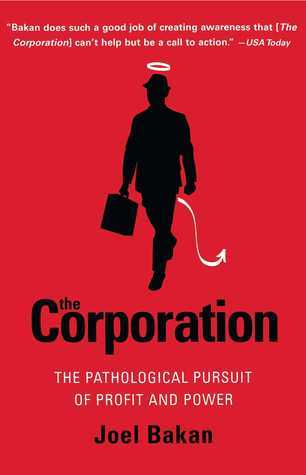
Okay, yes. This isn't about political *psychology*, but it's shares the purpose of explaining why things are the way things are in the US, and thus I recommend reading it with the others.
Summary:
The inspiration for the film that won the 2004 Sundance Film Festival Audience Award for Best Documentary, The Corporation contends that the corporation is created by law to function much like a psychopathic personality, whose destructive behavior, if unchecked, leads to scandal and ruin.
Over the last 150 years the corporation has risen from relative obscurity to become the world’s dominant economic institution. Eminent Canadian law professor and legal theorist Joel Bakan contends that today's corporation is a pathological institution, a dangerous possessor of the great power it wields over people and societies.
In this revolutionary assessment of the history, character, and globalization of the modern business corporation, Bakan backs his premise with the following observations:
- The corporation’s legally defined mandate is to pursue relentlessly and without exception its own economic self-interest, regardless of the harmful consequences it might cause to others.
- The corporation’s unbridled self-interest victimizes individuals, society, and, when it goes awry, even shareholders and can cause corporations to self-destruct, as recent Wall Street scandals reveal.
- Governments have freed the corporation, despite its flawed character, from legal constraints through deregulation and granted it ever greater authority over society through privatization.
But Bakan believes change is possible and he outlines a far-reaching program of achievable reforms through legal regulation and democratic control.
Featuring in-depth interviews with such wide-ranging figures as Nobel Prize winner Milton Friedman, business guru Peter Drucker, and cultural critic Noam Chomsky, The Corporation is an extraordinary work that will educate and enlighten students, CEOs, whistle-blowers, power brokers, pawns, pundits, and politicians alike.
My March 2017 Goodreads Review:
This book was a surprisingly vital read. I have known that corporations are pulling the strings of our government these days, but I had no idea just how little I understood how they were run and how tightly controlled they are by laws that literally force them to screw over public health&safety, the environment, worker well-being, and "the public good" in order to maximize shareholder profits.
I knew that's the M.O. of corporations, but I thought that it was horrible, sh*tty CEOs & shady over-ambitious business people responsible for it, and I figured that (in addition to regulations), getting decent humans into these corporate positions could drastically change the world for the better, by caring about "the public good" in addition to profits. I had no idea that there were such robust laws in place that actually prevents good folks from doing exactly that, AND how the WTO is a tool of the corporations to prevent governments from passing laws to regulate corporations in any way that would mitigate their negative effects on the public/environment that would impinge on their profits.And I didn't have any idea how many of the legit-sh*tty business people truly considered it IMMORAL (!) for a CEO to try to protect the public or the environment if it would prevent so much as a single dollar of profit from the company & shareholders. IMMORAL! Wow.
I found this book well written and easy to read(/listen to), and very important for understanding the basics of corporations and their history, laws, and norms, and how that effects our democracy (spoiler: as corporations function now, they nearly entirely undermine the whole democratic process). It was also an important reminder of how vital regulations are, and how patently absurd the corporations claims that they can self-regulate are-- especially in light of the fact that they literally and legally CAN NOT self-regulate in any way that might cost a few extra bucks!
Dark Money: The Hidden History of the Billionaires Behind the Rise of the Radical Right

Like The Corporation, this isn't a political *psychology* book, but still deserves to be on the same shelf. This is book is about the people that fund the political psychology-based conservative (read: radical libertarian) think tanks that pull all the strings that cause people to believe what these people want them to believe.
Summary:
Why is America living in an age of profound economic inequality? Why, despite the desperate need to address climate change, have even modest environmental efforts been defeated again and again? Why have protections for employees been decimated? Why do hedge-fund billionaires pay a far lower tax rate than middle-class workers?
The conventional answer is that a popular uprising against “big government” led to the ascendancy of a broad-based conservative movement. But as Jane Mayer shows in this powerful, meticulously reported history, a network of exceedingly wealthy people with extreme libertarian views bankrolled a systematic, step-by-step plan to fundamentally alter the American political system.
The network has brought together some of the richest people on the planet. Their core beliefs—that taxes are a form of tyranny; that government oversight of business is an assault on freedom—are sincerely held. But these beliefs also advance their personal and corporate interests: Many of their companies have run afoul of federal pollution, worker safety, securities, and tax laws.
The chief figures in the network are Charles and David Koch, whose father made his fortune in part by building oil refineries in Stalin’s Russia and Hitler’s Germany. The patriarch later was a founding member of the John Birch Society, whose politics were so radical it believed Dwight Eisenhower was a communist. The brothers were schooled in a political philosophy that asserted the only role of government is to provide security and to enforce property rights.
When libertarian ideas proved decidedly unpopular with voters, the Koch brothers and their allies chose another path. If they pooled their vast resources, they could fund an interlocking array of organizations that could work in tandem to influence and ultimately control academic institutions, think tanks, the courts, statehouses, Congress, and, they hoped, the presidency. Richard Mellon Scaife, the mercurial heir to banking and oil fortunes, had the brilliant insight that most of their political activities could be written off as tax-deductible “philanthropy.”
These organizations were given innocuous names such as Americans for Prosperity. Funding sources were hidden whenever possible. This process reached its apotheosis with the allegedly populist Tea Party movement, abetted mightily by the Citizens United decision—a case conceived of by legal advocates funded by the network.
The political operatives the network employs are disciplined, smart, and at times ruthless. Mayer documents instances in which people affiliated with these groups hired private detectives to impugn whistle-blowers, journalists, and even government investigators. And their efforts have been remarkably successful. Libertarian views on taxes and regulation, once far outside the mainstream and still rejected by most Americans, are ascendant in the majority of state governments, the Supreme Court, and Congress. Meaningful environmental, labor, finance, and tax reforms have been stymied.
Jane Mayer spent five years conducting hundreds of interviews-including with several sources within the network-and scoured public records, private papers, and court proceedings in reporting this book. In a taut and utterly convincing narrative, she traces the byzantine trail of the billions of dollars spent by the network and provides vivid portraits of the colorful figures behind the new American oligarchy.
Dark Money is a book that must be read by anyone who cares about the future of American democracy.
My Jan 2017 Goodreads Review:
I have been telling everyone I've talked to since starting this book to READ IT. Our country is falling apart, yes, but it goes far beyond Trump, and we aren't going to be able to stop it and save our democracy, unless we know what's going on.
This book is an excellent look at the billionaire Koch brothers and a few other key families/donors in their network, and how they & their anacho-capitalism (They want NO government except what is necessary to protect private property rights) have infiltrated the GOP and our government and are now pulling the strings. They are NOT conservatives, they are extremist libertarians.
And if anything could get Americans across the political spectrum to agree, it's that the Koch network is dangerously anti-American (to put it lightly) and MUST be stopped. More people just need to know about how deeply this goes.
